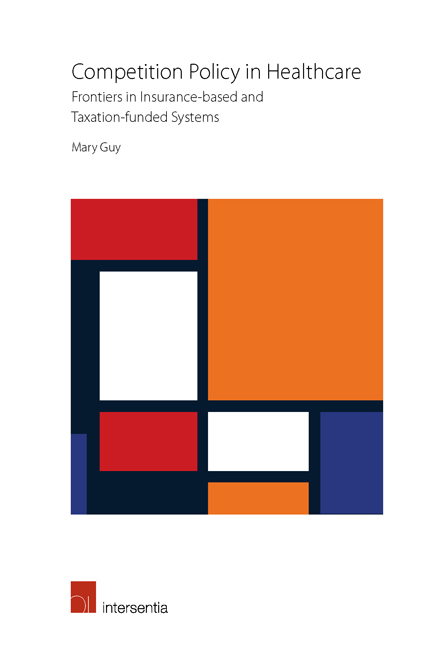Book contents
- Frontmatter
- Foreword
- Preface
- Acknowledgements
- Contents
- List of Cases
- List of Legislation
- Table of Figures
- Abbreviations
- Introduction
- Chapter 1 Competition Reforms in Dutch and English Healthcare and the Development of Competition Policy
- Chapter 2 Competition Law: Its Applicability and Application in Dutch and English Healthcare
- Chapter 3 Sectoral Regulation: The Relationship between the Competition Authority and the Healthcare Regulator in the Netherlands and England
- Chapter 4 Merger Control: Hospital Mergers, General Merger Control and the Development of ‘Healthcare-Specific’ Merger Control in the Netherlands and England
- Conclusion
- Bibliography
- Index
- About the Author
Chapter 4 - Merger Control: Hospital Mergers, General Merger Control and the Development of ‘Healthcare-Specific’ Merger Control in the Netherlands and England
Published online by Cambridge University Press: 30 March 2019
- Frontmatter
- Foreword
- Preface
- Acknowledgements
- Contents
- List of Cases
- List of Legislation
- Table of Figures
- Abbreviations
- Introduction
- Chapter 1 Competition Reforms in Dutch and English Healthcare and the Development of Competition Policy
- Chapter 2 Competition Law: Its Applicability and Application in Dutch and English Healthcare
- Chapter 3 Sectoral Regulation: The Relationship between the Competition Authority and the Healthcare Regulator in the Netherlands and England
- Chapter 4 Merger Control: Hospital Mergers, General Merger Control and the Development of ‘Healthcare-Specific’ Merger Control in the Netherlands and England
- Conclusion
- Bibliography
- Index
- About the Author
Summary
INTRODUCTION
In contrast to the Dutch and English experiences of applying competition law to healthcare, the applicability of general merger control to hospital mergers is notably less contentious in either country. The relationship between the competition authority and sectoral regulator is also notably clearer: the former has exclusive competence to approve or block a merger, whilst the latter's input is limited to an advisory function. A further contrast is seen in hospital mergers representing a comparatively active area in terms of the number of cases. In the Netherlands, the trend has been towards a steady number of hospital mergers: 15 between 2012 and 2014, 9 in 2014, and 8 in 2015 and 2016. Within the wider Dutch ‘healthcare sector’, the number of mergers is increasing, from 73 in 2015 and 81 in 2016 to 90 in 2017. In England, there were six hospital mergers (involving NHS Foundation Trusts) between 2012 and 2016 subsequent to the Health and Social Care Act 2012 (HSCA 2012) reforms. The period of 2016 – 17 saw a ‘marked increase’ in NHS mergers, some of which are reviewable under general merger control, and the number of mergers is expected to rise.
Indeed, merger activity has been considered a logical response to the opening up of Dutch hospital markets as previously unregulated markets strived for efficiency. Dutch hospitals have cited the bargaining power of health insurers, stricter quality requirements and increased competition between hospitals as reasons for merging. However, motivation for merging in Dutch healthcare more generally appears to vary across different types of treatment. For example, mergers in the home care sector appear driven primarily by insolvencies, whereas scale plays a notable role in maternity care mergers and healthcare chains, oft en supported by private equity partners driving mergers in the oral care sector.
In England, it might be considered that a similar logic for merging would apply to the NHS quasi-market as well, as it increasingly operates within a financially straitened environment: certainly motivation for mergers has included concerns about workforce size and the delivery of good outcomes across all services when a smaller provider is involved. However, ‘political drivers’ may also play a part alongside economic and clinical drivers for hospital mergers in connection with the English NHS.
- Type
- Chapter
- Information
- Competition Policy in HealthcareFrontiers in Insurance-based and Taxation-funded Systems, pp. 161 - 214Publisher: IntersentiaPrint publication year: 2019



